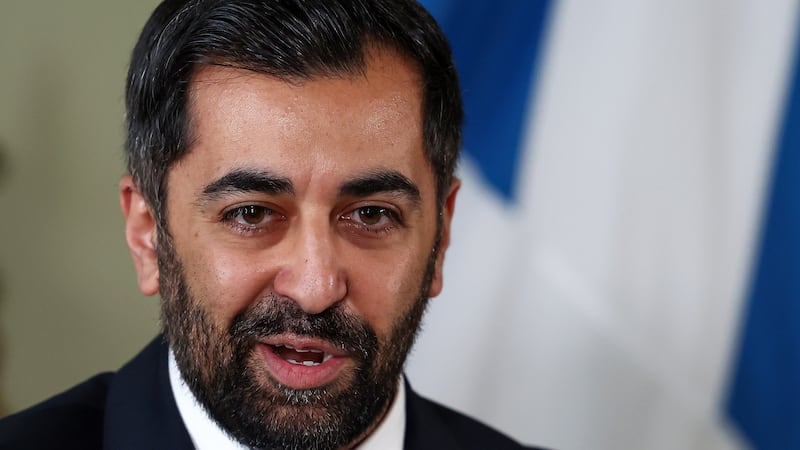SINN Féin and the DUP said last night they were hopeful of making progress on outstanding peace process issues during a fresh talks initiative ahead of the height of the marching season.
Keen to avoid a repeat of the violence that erupted in Belfast over a parading dispute last July, the north's two biggest parties are hoping a measure of agreement could help to reduce tensions this summer.
First Minister Peter Robinson and Deputy First Minister Martin McGuinness intend to convene two separate three-day sessions of talks with representatives of the five parties in the powersharing executive on parades, flags and the toxic legacy of the Troubles.
The renewed bid comes six months after marathon negotiations chaired by former US diplomat Richard Haass ended without agreement and only weeks before the loyal order parading season, which in recent years has sparked rioting in north Belfast, gets into full swing.
Last night Sinn Féin president Gerry Adams said: "We don't under-estimate the difficulties but we now have a window of opportunity."
DUP MP Jeffrey Donaldson, one of the party's key negotiators during the Haass talks, said progress could be made if the will existed on all sides.
"All of the parties know the issues that need to be resolved and we remain hopeful that further progress can be made and that's why we are keen to intensify the discussions over the next few weeks before the summer," he said.
"I think that progress is possible if there is a will to resolve the issues that continue to separate us."
Mr Adams said his party would also be holding talks with British prime minister David Cameron and Taoiseach Enda Kenny.
Mr McGuinness said: "We have agreed that there will be an intensive period of talks in what is likely a very limited window of opportunity up until I suppose the first couple of days of July.
"We enter that in the same spirit as we entered the Haass talks, absolutely determined to find a way forward to get agreement."
The negotiations are in part an effort to avoid violence which has characterised Twelfth of July loyal order demonstrations in north Belfast.
Restrictions have in the past been imposed on a parade through a short stretch of road passing nation-alist housing in Ardoyne but a heavy security presence has been necessary to enforce the separation of loyalists and republicans and keep the peace.
In past years dissident republicans opposed to the peace process have engaged in violence at the sectarian flashpoint, hurling petrol bombs and other missiles at riot police.
Last year loyalist rioters targeted police during a number of nights of trouble, sparked when the Orange Order parade was banned from returning home from Twelfth commemorations past the Ardoyne.
With relations at the heart of the DUP/Sinn Fein-led coalition at one of their lowest ebbs, the odds on significant movement being achieved before contentious marches take place will be long.
Though no firm dates have been set for the fresh rounds of talks, it is understood the parties have been asked to submit the names of their negotiating teams by tomorrow.
Tánaiste Eamon Gilmore held talks with politicians in Belfast yesterday.
He said: "I sense that there is a new momentum in efforts being made to secure agreement on the contentious issues of flags, parades and how to deal with the past."
While Sinn Féin and the SDLP wanted to implement a blueprint that emerged from the Haass process, the DUP and Ulster Unionists have demanded significant changes.
Alliance wants the plan implemented but wishes to make what, it insists, are necessary changes as it goes through legislative stages at Stormont.
While the draft proposals outlined by Dr Haass remain on the table, with the party leaders having met periodically to discuss the outstanding issues over the last six months, efforts to strike a deal in his absence have made little progress.
The UUP withdrew from negotiations following a political crisis triggered in February when details emerged about a deal Sinn Féin had struck with the British government that saw on-the-run (OTRs) republicans sent letters telling them they were not wanted by police.
Mr Gilmore said an opportunity to make progress still existed.
"I sense that that view is shared by the local parties and that there is a wish on the part of all of the political parties to see progress being made," he said.
Arrangements had been made for secretarial and administrative staff for the new talks process, the tánaiste said.
"The Irish government, together with the British government, will engage closely with this process to try and get matters brought to a conclusion," he said.
* TALKS: Deputy First Minister Martin McGuinness and Sinn Féin president Gerry Adams speak to the media after a meeting of Northern Ireland party leaders in Belfast yesterday
PICTURE:
Brian Lawless/PA


